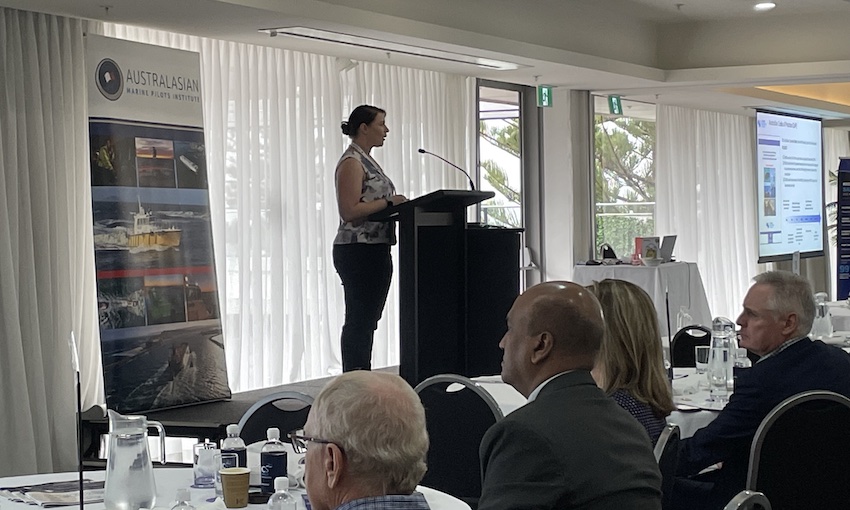DAY two of the Australian Marine Pilots Institute conference explored diversification in the maritime industry, the evolution of maritime technology, and how the transition into the industry’s future impacts the people at the centre of it.
Australia’s Maritime Future Conference took place over two days in Wollongong. Yesterday’s discussions were guided by topics including sustainability and human capital.
Captain Jeanine Drummond of Integral Maritime set the day into motion, encouraging pilots and port professionals to challenge their perception of the industry and work to create a diverse, equitable, and inclusive workforce environment.
“I believe it is time we looked at pilotage career pathways from a different perspective,” she said.
She highlighted the role of the younger generation in the future of maritime, and the urgency of building pathways for young professionals to enter seafaring and pilotage positions.
Hunterlink CEO Christine Field carried the focus on people into a discussion on crew welfare, and how pilots can use their position to support seafarers.
She said Huterlink has identified two clear trends in the nature of seafarers’ calls for help since the beginning of the pandemic.
Calls relating to suicide dominated the organisation’s helplines in 2020 and 2021, and workplace bullying and abuse have reportedly overtaken in 2022.
However, Ms Field said the importance of reaching crews to discuss mental health is not always recognised, which has created a major barrier to providing the appropriate support.
She said pilots have both the position and the responsibility to bridge this barrier and inform crews of available welfare services during interactions while onboard ships.
Highlighting the relationship between people and technology, Mehrangiz Shahbakhsh and Dr Reza Emad from the Australian Maritime College discussed the transition into Industry 5.0.
They outlined the changing role of pilots in a shifting landscape driven by automation.
Ms Shahbakhsh and Mr Emad unpacked the notion of Operator 4.0, which refers to the role of seafarers and pilots in this new landscape, and the vision to create a “trusting and interaction-based relationship between humans and machines”.
They said technology is not only evolving the ships themselves, but how people are trained to run them.
“There’s a difference between what we are teaching now and what we need to teach in the future,” Mr Emad said.
“Now, [crewmembers] are all human. Pilots are talking to masters, but in the future, they may need to talk to machines.”
Human factors researcher Matthew Thomas then explored the potential risks of relying on autonomous systems, particularly when the system is programmed to think it knows best.
He outlined measures to ensure those risks are mitigated, such as being prepared to take control back from the system.
Rachel Horne from the Trusted Autonomous Systems Defence Cooperative Research Centre (TAS) discussed how the research centre is regulating autonomous vessels operating in Australia.
“We’re looking at putting in place the ethical, legal, and regulatory frameworks that are needed to ensure trusted autonomous systems can be used and flourish in Australia,” she said.
The vessels currently in Australia are small, domestic, commercial vessels which are regulated by the Australian Maritime Safety Authority and generally require exemptions to operate.
Tim Visser, platform manager – Hawk 127 at CAE Australia, illustrated the importance of high-quality simulation programs in pilotage training by drawing on lessons from aviation training.
He used examples of fighter pilots’ responses to dangerous situations onboard aircraft to demonstrate how simulation-based training can influence human decisions in critical circumstances. He suggested the same principles apply to maritime pilotage.
“Quality simulation can be the difference between life and death,” he said.
“It can be relied on in emergency situations … repetition trains instinct and muscle memory, but only if you have a high-quality simulator.”
The conference concluded with an address from AMPI president Peter Dann, emphasising the role pilots play in promoting maritime safety.
“Good marine pilotage training standards are one of the cornerstones of good pilotage processes,” he said.
“A lot of work has been done on an alternate pathway structure, as we discussed earlier … and hopefully this can be moved into the next stage in the future.”

